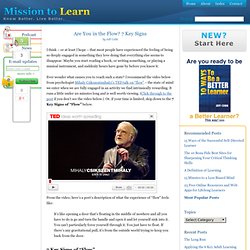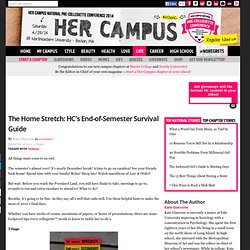

SNC2D1 Grade 10 Science Biology Test. Biology Notes for academic course biology tisues unit test SNC2D1 SNC2D1 Diffusion: the movement of fluids from an area of high concentration to a lower concentration Cell theory: -All living things are made up of one or more cells and their product -Cells is the simplest unit that can carry out all processes -All cells come from preexisting cells Prokaryote: no nucleus or other membrane: bound organelles (E-Coli) Eukaryote: has a nucleus and other organelles, each surrounded by a thin membrane (Animals/human if multicell, amoeba if single cell) Organelles Cytoplasm: suspends organelles in cells -Water, Jelly Like Endoplasmic Reticulum: transports materials around the cell.

Are You in the Flow? 7 Key Signs. I think – or at least I hope – that most people have experienced the feeling of being so deeply engaged in something they love doing that everything else seems to disappear.

Maybe you start reading a book, or writing something, or playing a musical instrument, and suddenly hours have gone by before you know it. Ever wonder what causes you to reach such a state? I recommend the video below from psychologist Mihaly Czikszentmihalyi’s TED talk on “flow” – the state of mind we enter when we are fully engaged in an activity we find intrinsically rewarding. It runs a little under 20 minutes long and is well worth viewing. (Click through to the post if you don’t see the video below.) From the video, here’s a poet’s description of what the experience of “flow” feels like: It’s like opening a door that’s floating in the middle of nowhere and all you have to do is go and turn the handle and open it and let yourself sink into it. Not surprisingly, learning is often the key to achieving “flow.” MindMeister.
Isabel Wright's Backpack. BibMe: Fast & Easy Bibliography Maker - MLA, APA, Chicago, Turabian - Free. Psychology Today - StumbleUpon. I did the "extended tour" of college. From about 1991-2002. I did get 4 degrees, so at least I have an excuse. :) I've also been an adjunct professor, so I've also been at the other side of the classroom. 1) The Freshman Fifteen does exist. So does the Freshman Twenty. Watch how many starches and processed foods you are eating. 2) Pizza - the ubiquitous college snack. 3) If it's either take out a loan or quit school, take out a loan. 4) If you can live harmoniously with someone in a 20×20 ft. space, you can do anything. 5) Flip-flops: Wear them in the dorm shower. 6) Always attend the *real* class, and use the Internet one for review. 7) If you are not a morning person, don't schedule classes for 7am. 8) Get involved on campus. 9) Too much socializing = bad grades. 10) If you are feeling overwhelmed, are having problems sleeping, or have gone through a breakup, visit your college's counseling center.
The Senior Resume for High School Students. Wise Bread Picks As a career-services provider, I have developed resumés for high school seniors to accompany their college applications.

Much of this work involved organizing innumerable details of a laundry list of activities, highlighting academic and extra-curricular achievements, and demonstrating leadership skills. Now, as the mom of a high school senior, I have a different take on the high-school resumé. While learning about the college-application process, I discovered that this document was not supposed to remake my nearly adult child into the most stellar applicant ever (though, certainly, there are students who reasonably have such a goal) but to show who he is. More precisely, its purpose is to shed light on how he spent his time, what novel and difficult situations he encountered, and what he valued (evidenced by how he allocated his hours in high school), whether in sync with his parent's desires or not.
To Dream, Or Not to Dream: Pursuing an “Unpractical” Career. 15 Ways to Productively Procrastinate. The Home Stretch: HC's End-of-Semester Survival Guide. All things must come to an end.

The semester’s almost over! It’s nearly December break! A time to go on vacation! See your friends back home! Spend time with your family! But wait. Breathe, it’s going to be fine. Whether you have weeks of exams, mountains of papers, or hours of presentations, there are some foolproof tips every collegiette™ needs to know to tackle her to-do’s. Triage It can be overwhelming when all you see in front of you is a pile of work the size of the Great Pyramid. Code Green (minor): Short papers, problem sets, forms you need to fill out, or other errands fall into this category. Amerigo Fabbri, Dean of Pierson College and student advisor at Yale University, breaks it down as a mathematical equation. Time Management 101: How To Stay On Top Of Everything. Fall semester is in full swing, and in addition to the papers and assignments that seem to keep piling up, your other activities are requiring more of your time as well.

So how can a busy collegiette™ like you find time for everything? By managing it, of course! Time management is a skill that everyone needs, but it is also a skill that takes planning and discipline. If you’re ready to learn how to manage your time well so that you have time for everything you love, read on! Plan for Every Day“Treat each day like an 8-5 job,” said Melissa Medlin, the director of Career Planning and Development at the University of North Alabama. Don’t Procrastinate“You might work better under pressure… until that pressure pops,” said Medlin.